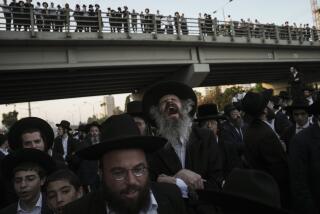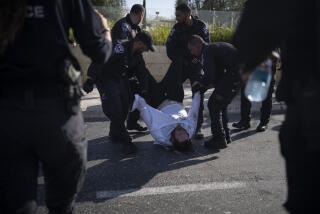The Struggle for Jewish Unity
- Share via
JERUSALEM — As Israel marked the second anniversary of the assassination of Prime Minister Yitzhak Rabin by an Orthodox Jewish extremist, Israeli Orthodoxy once again was confronting the consequences of delegitimizing fellow Jews with whom it disagrees. The intensifying rift between Orthodox and non-Orthodox Judaism has created a theological crisis within Orthodoxy itself.
Contrary to all expectations, a government-appointed committee, which includes moderate Orthodox as well as Reform and Conservative rabbis, has devised a workable compromise: Grant non-Orthodox rabbis participation in conversion and marriage procedures but let the Orthodox rabbinate ensure that those are conducted according to Orthodox law.
That sage compromise recognizes the reality of Jewish pluralism while preserving the senior status of the more venerable Orthodox tradition--and recognizes too the political reality that most of the world’s Conservative and Reform Jews don’t live and vote in Israel.
The Orthodox estab-lishment’s initial reaction was outright rejection of that generous compromise, refusing to consider any legal status for non-Orthodox rabbis. The opposition of the ultra-Orthodox, for whom any religious compromise is anathema, was hardly unexpected. More surprising, though, was the rejection from leaders of the so-called modern Orthodox, or religious Zionist, camp.
Unlike the ultra-Orthodox whom they outnumber, religious Zionists are integral to modern Israeli society. But by opting for a hard-line interpretation of Jewish law and dismissing the demands of Jewish unity, mainstream religious Zionism has come perilously close to adopting the self-ghettoizing theology of ultra-Orthodoxy.
In Jewish thought, the unity of the people of Israel is a theological imperative, a recognition that the Jews aren’t just a religion but a nationality. Jewish unity is said to reflect the oneness of God: The Jews could only receive the Torah at Sinai, notes the medieval biblical commentator Rashi, when they had become “as one man with one heart.” And so religious Zionists traditionally sought lenient interpretations of Jewish law to preserve the oneness of the Jewish people. Their devotion to national unity allowed them to cooperate with secular Zionists in creating a Jewish state, a strategy vehemently denounced by the ultra-Orthodox. That same devotion allowed the religious Zionist members of the government committee on conversion to compromise with the non-Orthodox.
In recent years, though, the centrality of Jewish unity has weakened within religious Zionism. The most radical expression of that erosion was the assassination of Yitzhak Rabin by Yigal Amir, a member of the religious Zionist camp. According to a just-released study conducted at the Orthodox-sponsored Bar Ilan University, an astonishing 27% of students in religious Zionist high schools approved of the Rabin assassination, revealing the depth of the crisis over Jewish unity.
Though hardly comparable to the assassination, the rejection by most of the religious Zionist establishment of the conversion compromise sends the same theological message: The unity of Israel is superseded by other, more pressing concerns, whether the prevention of withdrawal from the West Bank in Amir’s rationale or enforcing the strictest interpretation of Jewish law.
Still, significant voices within religious Zionism have endorsed the conversion committee’s compromise, including politically hard-line but religiously moderate rabbis from West Bank settlements. And for the first time, the state-sponsored chief rabbinate, in a grudging concession to pressure from religious Zionist moderates, has sent a representative to meet with Reform and Conservative rabbis. While Western-style religious pluralism isn’t an Orthodox value, as one Orthodox member of the conversion committee notes, Jewish unity certainly is. And the discomfort within the religious Zionist community over its own leadership’s opposition to compromise is growing.
Reform and Conservative leaders need to appreciate those nuances and seek out potential Orthodox allies. They should avoid stereotyping all Orthodox Jews as rejectionists. Emotionally gratifying but politically self-defeating pressure tactics, like threatening to suspend donations to Israel, will only solidify Orthodox opposition and erode support for non-Orthodox enfranchisement among Israelis generally--the majority of whom, according to polls, support religious pluralism.
The Reform movement needs to refrain from extreme positions alienating even the most moderate Orthodox Jews. In particular, it should revoke its decision to recognize as Jews anyone descendant from either a Jewish father or mother. By violating the ancient determination of Jewishness through the mother alone, Reform rabbis are creating a situation whereby Orthodox and Reform will be incapable of marrying each other.
No one camp alone is responsible for Jewish fragmentation. Only a real commitment among all factions to the unity of Israel will prevent the disintegration of the Jews into separate, irreconcilable entities.
More to Read
Sign up for Essential California
The most important California stories and recommendations in your inbox every morning.
You may occasionally receive promotional content from the Los Angeles Times.










